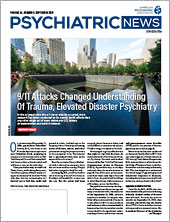Women in the reproductive and postpartum period are in the most vulnerable stage of life for developing a mental illness and requiring psychiatric hospitalization. Perinatal mood and anxiety disorders (PMADs) are a spectrum of mental illnesses specific to women.
It is estimated that women are 25 times more likely to experience psychosis in the postpartum period than in any other period of their lives. In the first four weeks after having a baby, first-onset psychosis occurs at a rate 23 times higher than any other developmental period. The World Health Organization last year linked postpartum psychosis to suicide and/or maternal filicide. Classic symptoms of postpartum psychosis are markedly distinct from psychosis unrelated to childbirth. The relapse rate of women with postpartum psychosis is up to 80%, and DSM-5 indicates that 4% of women diagnosed with postpartum psychosis perpetrate filicide.
Some of these women have been evaluated to be psychotic during the commission of the offense and found not guilty by reason of insanity (NGRI). In those cases, they are likely to receive proper treatment; the fate of other women is to be found guilty by the courts and receive life sentences or execution, even though they too were assessed to be in a psychotic state at the time of the offense.
For example, one ruling by the U.S. courts occurred in 2014 with Carol Coronado in California. Coronado took the lives of her three daughters, aged 2.5 years, 16 months, and 2 months. After the stabbings, she was found by the police, lying naked in bed next to her deceased children, attempting to pry her stab wounds open with her fingers. She was unresponsive and had no recollection of the events. Coronado was evaluated by defense experts to be suffering from postpartum psychosis at the time of the crime, and the prosecution’s first forensic expert also found her to be insane. However, a second evaluation by the state’s expert produced a diagnosis of sanity and only mild depression. The trial judge noted the significant gap between the state expert’s testimony and other accounts but sentenced Coronado to three consecutive life sentences, without the possibility of parole.
In contrast, 20 years ago in Houston, Andrea Yates took the lives of her five children and faced the death penalty. In her first trial in 2002, she was convicted of murder and sentenced to life in prison. The state argued that she was not insane at the time because she knew what she was doing was legally wrong. The second trial, in 2006, was granted because perjury by the prosecution’s expert witness in the first trial was discovered. The jury upheld the insanity defense, and Yates was acquitted as not guilty by reason of insanity (
Psychiatric News).
In her psychotic mind, ending her children’s lives was necessary to protect them from eternal damnation. Yates also believed that Satan lived within her and that by her own execution at the hands of the state, she would expunge the world of Satan’s evil. The courts demonstrated rightful compassion for the impact of postpartum psychosis, and its interpretation by case law was apt. Clearly, myriad factors influence the outcome of these trials. Determining criminal responsibility and the guilt or innocence of a woman includes a wide range of inconsistencies as seen in the cases of Yates and Coronado. Women’s lives hang in the balance, and too often the outcome of their fate is dependent on a host of idiosyncratic variables:
•
Systemic gender, ethnicity, and race issues.
•
The variable knowledge and understanding of lawyers, defense teams, prosecutors, juries, expert witnesses, and judges of maternal filicide.
•
The number of similar cases that have been tried around the same time, their outcome, and the public perception of those cases.
•
The degree of local community compassion.
•
The defendants’ and families’ access to resources, including knowledgeable lawyers and forensic experts.
Psychiatrists are among the professionals responsible for providing forensic evaluation of the defendant in such cases; it is crucial to know the full scope, as well as the limits, of the role. In a chapter in our new book, Infanticide and Filicide: Foundations in Maternal Mental Health Forensics, the authors cite research showing three competencies foundational to success as an expert witness: criminal justice, psychiatry, and maternal mental illness.
Reproductive and perinatal forensic psychiatrists are optimally trained as experts in maternal filicide cases. As such, it is prudent to consult with them.
When serving as an expert witness in court, a psychiatrist needs do the following:
•
Know the legal definition of insanity in a given jurisdiction. For example, there are four states—Idaho, Kansas, Montana, and Utah—that do not have an insanity defense; Illinois passed the first postpartum criminal law in the United States in 2018; and the Massachusetts Legislative Commission is in preliminary stages of passing a comprehensive postpartum psychosis bill through the senate.
•
Know the different motivations of maternal filicide described by Philip Resnick in 1969: altruistic, acutely psychotic, unwanted child, child maltreatment, and spousal revenge.
•
Understand perinatal mental illness, particularly postpartum psychosis, and consider the role of childhood traumas in postpartum psychosis.
•
Record the defendant on video during the forensic interview and view recordings and accounts of the mother as close to the offense as possible to observe and have evidence of the mental state of the defendant before she is medicated.
•
Arrange follow-up evaluations to observe the mother after medicated.
•
Obtain collateral information to assess the mother’s state of mind prior to, and during, the commission of the offense. Ascertain whether family, neighbors, or friends noticed any changes in behavior.
•
Gather the client’s psychiatric history, family psychiatric history, obstetric history, evidence of birth trauma, and history of any previous pregnancies with perinatal mood disorders.
•
Evaluate the sleep and stress patterns surrounding the pregnancy and postpartum period. ■
References
1.
Diagnostic and Statistical Manual of Mental Disorders, 5th Edition. Arlington, Va.: American Psychiatric Association, 2013
2.
Bergink V, Rasgon N, Wisner KL: Postpartum Psychosis: Madness, Mania, and Melancholia in Motherhood. Am J Psychiatry. 2016: 173(12):1179–1188, 2016.
3.
Resnick PJ: Child Murder by Parents: A Psychiatric Review of Filicide. Am J Psychiatry. 1969; 126(3):325–334.
4.
Marks MN: Characteristics and Causes of Infanticide in Britain. Int Rev Psychiatry. 1996: 8(1):99–106.
5.
Wisner KL, Peindl KS, Hanusa BH: Symptomatology of Affective snd Psychotic Illnesses Related to Childbearing. J Affect Disord. 1994: 30(2):77–87.
6.
Wisner KL, Gracious BL, Piontek CM, et al: Postpartum Disorders: Phenomenology, Treatment Approaches, and Relationship to Infanticide in Infanticide: Psychosocial and Legal Perspectives on Mothers Who Kill. Edited by Spinelli MG. Washington DC: American Psychiatric Publishing, 2003.
7.
Wong G, Bell K. Becoming an Expert Witness in Maternal Filicide Cases. In Wong G Wong, Parnham G, eds. Infanticide and Filicide: Foundations in Maternal Mental Health Forensics. Arlington, VA: American Psychiatric Publishing, 2021.

